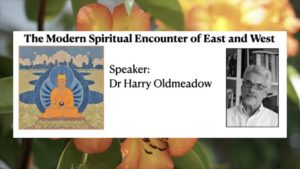The Modern Spiritual Encounter of East and West
Over the past two centuries the spiritual and religious contact of East and West has broadened and intensified. Some of the landmark developments in this process were the establishment of the Royal Asiatic Society and the burgeoning of Orientalism as a field of study, the engagement of Romantic philosophers with the religious thought of India and China, the Transcendentalist and Theosophical movements of the 19th century, and the World Parliament of Religions in 1893. The 20th century witnessed the growth of interest not only in Eastern doctrines but in many spiritual and psycho-physical disciplines such as yoga, meditation and martial arts. The counter-culture of the Beats and hippies evinced a new interest in “consciousness-changing” and “mystical” experience. A raft of Eastern “gurus” of various stripe appeared in the West, attracting many followers. The Tibetan diaspora provided a further impetus to these developments as the custodians of the Tibetan Buddhist tradition fled to the West, many of them opening new centres in different parts of the world, not least here in Australia. At the same time many Western countries were moving towards more multicultural societies in which people of different ethnic, cultural and religious backgrounds now rubbed shoulders on a daily basis. The intermingling of religious traditions has also foregrounded a range of questions about religious fundamentalism, pluralism, universalism, and mysticism, and generated new interest in various expressions of “the perennial philosophy”, popularized in Aldous Huxley’s book of that name (1945). A significant development was the emergence of a school of perennialist thought issuing from the work of figures like René Guénon, Ananda Coomaraswamy and Frithjof Schuon. The talk will consider our subject from this particular perspective. What kinds of challenges does modernity (and its accompanying worldview) pose for traditions of both East and West? What are some of the effects of the East-West encounter? What is religious fundamentalism, pluralism and universalism? The talk will explore questions of this kind, drawing some of its illustrative material from the situation of Tibetan Buddhism in the contemporary West. There will be plenty of time for questions and discussion.
Dr Harry Oldmeadow was formerly Coordinator of Philosophy and Religious Studies at La Trobe University Bendigo. His interests include the Perennial Philosophy, mysticism, critiques of modernity, the spiritual encounter of East and West, environmental philosophy and the primordial traditions of indigenous peoples. He has also published in the fields of literature and cinema studies. Harry’s books include
- Journeys East: 20th Century Western Encounters with Eastern Religious Traditions, Frithjof Schuon and the Perennial Philosophy,
- Black Elk: Lakota Visionary and, most recently, Timeless Truths and
- Modern Delusions: The Perennial Philosophy as a Guide for Contemporary Buddhists
To purchase a copy of Dr Oldmeadow’s book, go to www.platformbooks.co
Paperback:
- https://www.amazon.com.au/Timeless-Truths-Modern-Delusions-contemporary/dp/0648883027/ref=sr_1_1?crid=245D12XO0OQQV&keywords=timeless+truths+and+modern+delusions&qid=1638519893&sprefix=timeless+truths%2Caps%2C343&sr=8-1
- https://www.platformbooks.co/products/timeless-truths-and-modern-delusions-the-perennial-philosophy-as-a-guide-for-contemporary-buddhists
Ebook:
- https://www.amazon.com.au/Timeless-Truths-Modern-Delusions-contemporary-ebook/dp/B0963YMFNP/ref=tmm_kin_swatch_0?_encoding=UTF8&qid=1638520011&sr=8-1
- https://www.platformbooks.co/products/timeless-truths-and-modern-delusions-ebook-the-perennial-philosophy-as-a-guide-for-contemporary-buddhists
The video from the International Association of Near Death Experience Studies (IANDS) on Emanuel Swedenborg can be found at: https://www.youtube.com/watch?v=c5Kw2h1-_68

